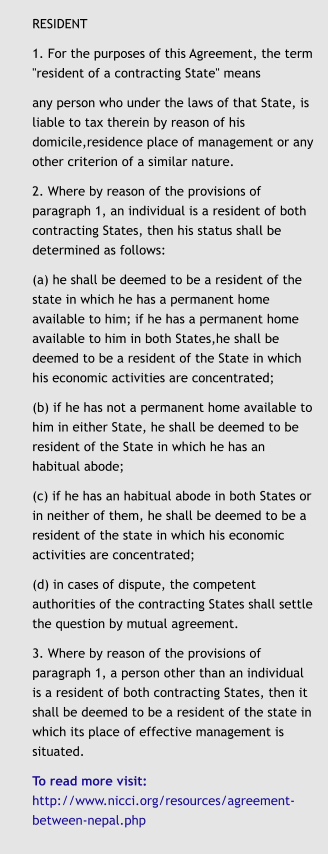Q609. Spend time in Nepal to keep NRI status in India . . .
Question: Dear Sirs, A foreigner ,having OCI card, stays for 180 days in India .During the rest of the financial year he stays in Nepal. Will he be treated as NON resident for Indian Taxation purposes? Thanks to clarify! Best regards Answer: It is not easy to answer your question with a simple yes or no! Each case is different. Generally, the purpose or shall I say the intent, the actual reason why a Indian resident leaves India, is what the tax authorities might look at rather than simply going by the number of days. Furthermore, OCI holders who generate income in India are liable to pay tax on that income regardless of the number of days they have stayed in India. A resident of India who travels abroad for purposes that do not clearly indicate an intention to stay out of India for an indefinite period would not be considered a NRI for Indian tax purposes. However, as I said earlier, each case would depend on the circumstances and the perception of the tax officer. In a situation such as described in your email, where a foreigner with OCI stays 180 days in India and spends the rest of the financial year in Nepal. The main place of residency such as where the persons permanent home is located, where income is generated etc. are considered. India and Nepal do have a tax agreement and to give you an idea, shown below is an excerpt from Article 4 of the agreement:
Disclaimer: Information provided is for general knowledge only and should not be deemed to be professional advice. For professional advice kindly consult a professional
accountant, immigration advisor or the Indian consulate. Rules and regulations do change from time to time. Please note that in case of any variation between what has been
stated on this website and the relevant Act, Rules, Regulations, Policy Statements etc. the latter shall prevail.
© Copyright 2006 Nriinformation.com
RESIDENT
1. For the purposes of this Agreement, the term "resident of a contracting State" means
any person who under the laws of that State, is liable to tax therein by reason of his domicile,residence place of
management or any other criterion of a similar nature.
2. Where by reason of the provisions of paragraph 1, an individual is a resident of both contracting States, then his status
shall be determined as follows:
(a) he shall be deemed to be a resident of the state in which he has a permanent home available to him; if he has a
permanent home available to him in both States,he shall be deemed to be a resident of the State in which his economic
activities are concentrated;
(b) if he has not a permanent home available to him in either State, he shall be deemed to be resident of the State in
which he has an habitual abode;
(c) if he has an habitual abode in both States or in neither of them, he shall be deemed to be a resident of the state in
which his economic activities are concentrated;
(d) in cases of dispute, the competent authorities of the contracting States shall settle the question by mutual agreement.
3. Where by reason of the provisions of paragraph 1, a person other than an individual is a resident of both contracting
States, then it shall be deemed to be a resident of the state in which its place of effective management is situated.
To read more visit: http://www.nicci.org/resources/agreement-between-nepal.php

NriInformation Questions &Answers
Read Disclaimer at bottom of page

NRI - OCI - PIO Guide & Information
Q609. Spend time in Nepal to
keep NRI status in India . . .
Question: Dear Sirs, A foreigner ,having OCI card, stays for 180 days in India .During the rest of the financial year he stays in Nepal. Will he be treated as NON resident for Indian Taxation purposes? Thanks to clarify! Best regards Answer: It is not easy to answer your question with a simple yes or no! Each case is different. Generally, the purpose or shall I say the intent, the actual reason why a Indian resident leaves India, is what the tax authorities might look at rather than simply going by the number of days. Furthermore, OCI holders who generate income in India are liable to pay tax on that income regardless of the number of days they have stayed in India. A resident of India who travels abroad for purposes that do not clearly indicate an intention to stay out of India for an indefinite period would not be considered a NRI for Indian tax purposes. However, as I said earlier, each case would depend on the circumstances and the perception of the tax officer. In a situation such as described in your email, where a foreigner with OCI stays 180 days in India and spends the rest of the financial year in Nepal. The main place of residency such as where the persons permanent home is located, where income is generated etc. are considered. India and Nepal do have a tax agreement and to give you an idea, shown below is an excerpt from Article 4 of the agreement:
N
RI Information
Informing
educating and connecting Indians across the globe


© Copyright 2006 Nriinformation.com
NriInformation FAQ
Read Disclaimer at bottom of page








































